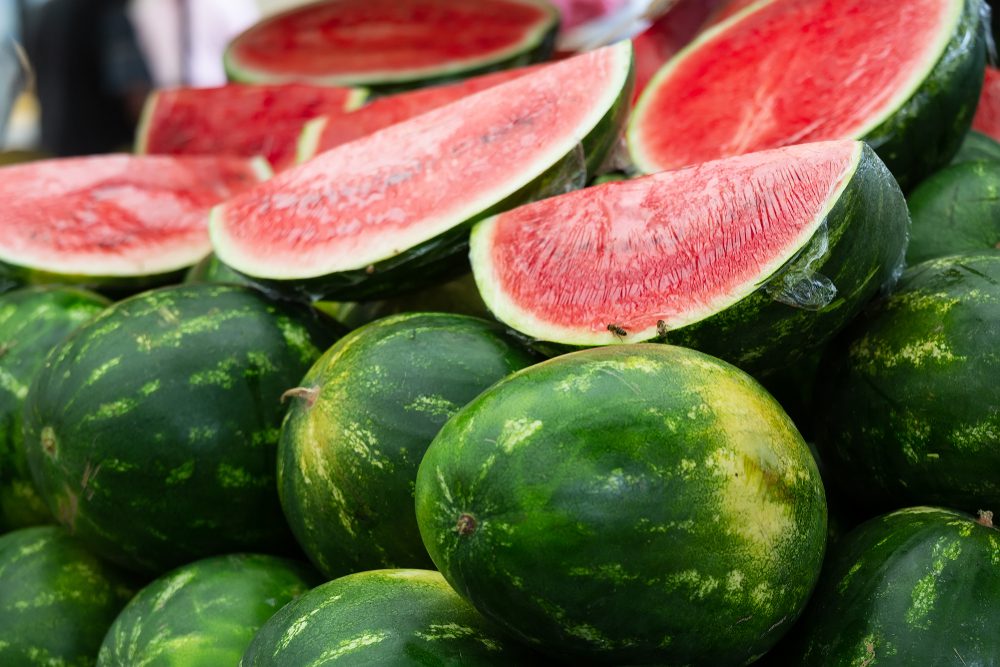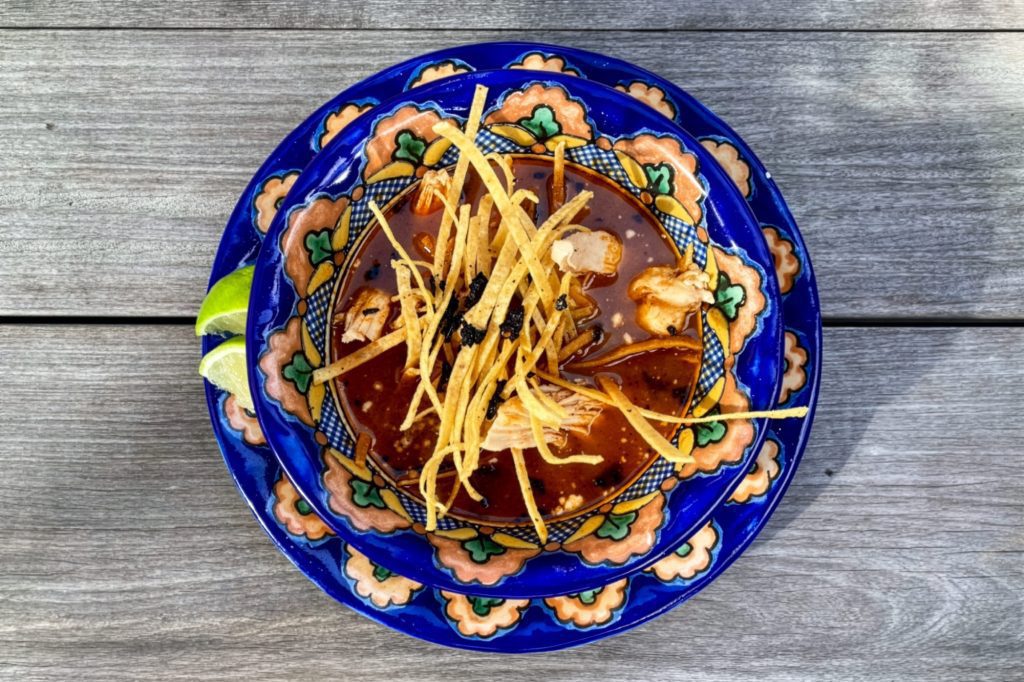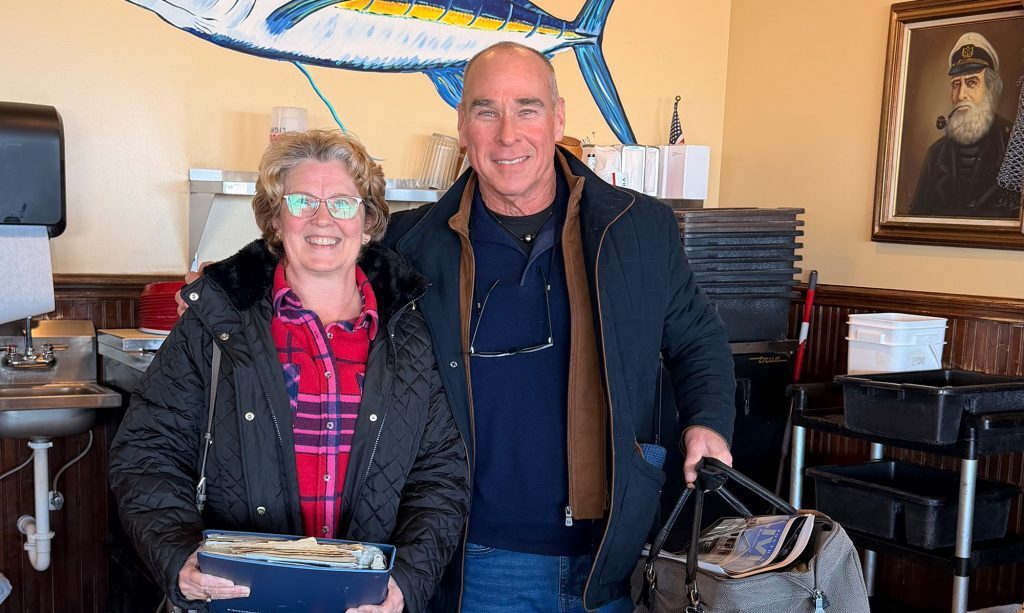
Restauranteur Robert St. John reflects on the unique role watermelon plays in Mississippi with a story from his own youth.
If I were to make a list of my favorite fruits, it would be extensive. Peaches would top the list. The remaining players would vacillate by mood or season. Blackberries and blueberries are plentiful in these parts this time of year. I’ve loved bananas since I was a kid and ate a lot of pears in my youth. I like all varieties of grapes and most varieties of apples.
Typically, I would be ending my annual peach binge about now. Chilton County, Alabama peaches start making sometime in June and the season usually peters out in mid-July. Though 2023 will go down as an almost peach-less year. The late freeze on March 20th destroyed most of the fruit crops from north of Birmingham to the Coast. Local peach sightings have been rare.
My friend Tim Goggans, owner of Sandy Run Farm just outside of Hattiesburg, said he lost more than 80% of his blueberry and blackberry crop during that freeze. We’ve been able to get some berries from him as he has been taking care of his local clientele, but his bulk business is almost a wash.
I’m not sure if watermelon would ever make the top-20 list of my favorite fruits. But 2023 has become the year of the watermelon. I have been consuming copious amounts of watermelon this summer. I have probably eaten more watermelon in the past six weeks than I have in the previous 20 years. It’s probably the peach/blueberry/blackberry shortage that has caused this change in my summer fruit eating habits. Whatever it is, I have enjoyed and appreciated watermelon more than ever this summer.
I’m a salt-on-my-melon kind of guy. And whether it’s cantaloupe, honeydew, or watermelon, I like it salted. My grandmother used salt while eating melon. My mother used salt, too. I guess I was just raised that way. My wife thinks it’s ridiculous, but I’m OK with her being wrong.
My grandmother ate a slice of cantaloupe or a honeydew every morning. I don’t ever remember her serving or eating watermelon, but she was religious with the honeydew and cantaloupe and salt was always present (and lemon on honeydew). She lived to be a very healthy 96-years old.
I have written often about how peaches taste like summer. It’s the same for watermelon. They are available year round, but the locally grown summer melons taste best. There’s a chart that’s been floating around the internet that shows what to look for when choosing a watermelon, and apparently I’ve been choosing wrong for the past 60 years. According to the chart, the best watermelons are of uniform size and are heavy (not elongated). They should have an orange field spot and not a white one. Larger webbing means the melon will be sweet. Smaller webbing is a warning sign for a bland watermelon. You’ll know it’s ripe if the melon is dark and dull. If it’s shiny it’s not ripe.
I’m not a late comer to watermelons. I’ve been eating them most of my life, it’s just that— until this summer— I have prioritized other fruits ahead of watermelon. Maybe my aversion has to do with a high school incident that happened 46 years ago.
It was the summer of 1977. “Rocky” was in movie theaters, and “Hotel California” was on the radio. I was 15 years old and working nights as a radio station disc jockey. During the day I was on the summer cleaning crew at my high school to make extra money. The school was small and located on the outskirts of Hattiesburg, adjacent to a farm owned by the Duff family.
I was a member of a high school fraternity. One of my friends— and a coworker on the cleaning crew— was a pledge in the fraternity. This friend/pledge, Ricky, ended up doing most of the work on the cleaning crew that summer. We ordered him around a lot. “Pledge Ricky, wax the floors. Pledge Ricky, mow the grass. Pledge Ricky, fire up the incinerator.” I’m not sure if we knew what hazing was back then, but, at the time, this seemed less like hazing and more like laziness on everyone else’s part.
Ricky was new to our school. He wanted desperately to fit in, and he did all our bidding, without complaint. Ricky also owned a late 1960s model Volkswagen Beetle that various members of the crew would hop in at least once a day to go trail riding in the woods that led to the Duff farm.
One hot July day Ricky and I hopped in his Beetle with the hopes of “borrowing” a watermelon from the Duff family watermelon patch. I drove his beat up Volkswagen down the trail that led to the melon-filled field. Ricky probably would have never thought to steal a watermelon on his own. It was my idea. Unfortunately, his desire to fit in overruled his good judgment.
I parked the Volkswagen on the trail and sent him into the watermelon patch. He snuck halfway out and held one up. It looked good, but I wasn’t going to let him get off that easy. “Not big enough,” I yelled. He crept a little farther out and held up a larger one. “Bigger,” I said. He made it all the way to the other side of the field, and grabbed a watermelon that took most of his strength to hold over his head. “How’s this?” He asked.
“Perfect,” I said. “Let’s go!” On his way back to the car, I ordered, “Get two.” Ricky looked at me as if to say, “this isn’t worth it,” but he picked up a second watermelon nonetheless and began the long trudge across the watermelon patch.
It was at that moment we heard, “Hey! What are y’all doing?” coming from the Duff house. It was our classmate, Kenny Duff. We were caught.
Kenny hopped on a motorcycle and headed our way. “Run!” I yelled to Ricky.
From across the field, I could hear Ricky screaming while running through the watermelon patch. He was trying not to trip over other watermelons— kicking a few— but still carrying the giant watermelons under both arms. When I saw the motorcycle at the head of the jeep trail, I took off— without Ricky.
In my mind’s eye I can still see Ricky in the rear view mirror, eyes as big as saucers, tennis shoes covered with watermelon pulp, running behind me on the jeep trail. The look in his eyes was one of fright, bewilderment, and betrayal. He was pleading with me to stop the car. His car. I kept going. I don’t know how fast he was running, but I had the getaway car in third gear.
A slightly overweight fraternity pledge is no match for a motorcycle, and Ricky fell to the ground, landing on, and smashing, both watermelons. He was in a world of trouble. Kenny was not only the owner of the watermelon patch, but he was also the president of the fraternity, and there was a pledge meeting that night.
Ricky never told anyone who was driving the car.
After the Great Watermelon Heist of 1977, I quit my job at the school and focused on my budding radio career. I never again took anything that belonged to someone else.
I have never considered myself a bully and can recount countless times when I stood up for the little guy and the underdog in my youth. But writing this story as a 62-year-old man in 2023, I am ashamed of my behavior that day. Fraternity, or not, I shouldn’t have treated a fellow classmate that way.
I lost track of Ricky after high school. He moved off, probably up North where watermelons don’t grow. If I saw him today, I would apologize to him, and let him know that I am sorry, and that I was wrong, and— whether he knew it or not— he always fit in. In the end, he had been a much bigger man, than I. He had faced the music.
Yesterday, as I ate watermelon, I thought of Ricky, and how he was a better friend to me than I ever was to him. Lesson learned.
Onward.











